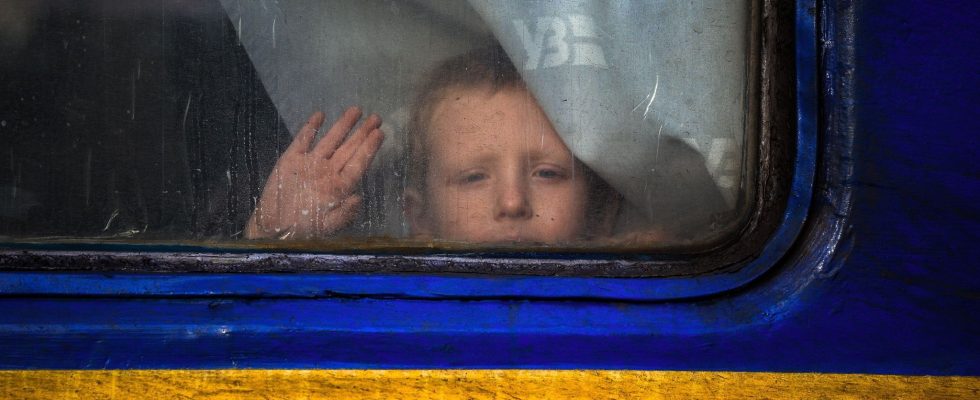As Russian attacks and bombings have escalated in Ukraine for more than a year, at least 464 children have died during the conflict, announced on March 11 the Prosecutor General’s Office of Ukraine. In addition, 934 were reportedly injured and 367 missing, adds the office, which specifies that the toll does not include the territories occupied by Russia or those where fighting is taking place.
According to the institution, the highest number of victims was documented in Donetsk and Kharkiv oblasts. The Prosecutor General’s Office also reported that nearly 16,226 Ukrainian children had been forcibly deported to Russia.
Bakhmout is a shield for the rest of the country
According to the British Ministry of Defence, the city of Bakhmout, bombarded relentlessly by the Russian army for more than a week, has become a “killing zone” which now constitutes the only obstacle to the advance of the mercenaries. of Wagner in their westward assault. The latest British intelligence update indicated that over the past four days, Wagner Group forces have taken control of most of eastern Bakhmut, while Ukrainian forces have held its west and demolished key bridges over the Bakhmutka River, “which now marks the front line”.
According to the ministry, “with Ukrainian units capable of firing from fortified buildings to the west, this area has become a deadly zone.” “However, the Ukrainian force and its supply lines in the west remain vulnerable to continued Russian attempts to outflank defenders in the north and south,” he said.
Wagner Group opens recruitment centers in Russia
The boss of the Russian paramilitary group Wagner announced on Friday the opening of 58 recruitment centers in 42 cities across Russia, as he seeks to replenish his troops which are suffering heavy losses in eastern Ukraine. The Wagner group is on the front line in the battle for the Ukrainian city of Bakhmout, and its boss, Yevgeny Prigojine, has himself admitted that many fighters from his organization have been killed there.
Against the backdrop of tensions with the Minister of Defense, the head of Wagner has repeatedly complained of no longer being able to recruit in Russian prisons, where the militia has enlisted prisoners on a massive scale in exchange for reduced sentences.
Canada halts some Russian imports
Canada has announced a ban on imports of Russian aluminum and steel products, in an effort to deprive Moscow of revenue to finance its war in Ukraine. They were worth almost C$250m (US$180m/£150m) in 2021, according to the latest government data. According to Reuters, a 200% tariff on Russian aluminum imports had already been announced last month by the United States, after the EU had already blocked Russian steel products last year.
Moscow denounces an “attempted” coup in Georgia
Georgia becomes a new area of conflict between Moscow and Washington. Russia presented the massive demonstrations in Georgia on Friday March 10 as an “attempt” of a Western coup. These forced the government to abandon a bill compared by its detractors to repressive Russian legislation. The Russian presidency said to see in the mobilization “the hand” of the United States striving to provoke “an anti-Russian feeling”.
After three days of demonstrations by tens of thousands of people, sometimes enamelled with violence, the Georgian Parliament finally revoked the controversial text on Friday. As the government had promised the day before, which had also announced the release of all those arrested on Tuesday and Wednesday. This movement illustrates the political crisis that has been agitating for several years in Georgia, a Caucasian country candidate for the EU, where part of the population fears an authoritarian drift on the Russian model.
For Moscow, the mobilization is a “pretext to launch an attempt at regime change by force”, said Friday the head of Russian diplomacy Sergei Lavrov. He compared the protests to the 2014 revolution in Ukraine, seen by Moscow as a coup plotted by the West that has supported Ukraine in the face of the Russian invasion for a year.
French nuclear “under the influence” of Russia according to Greenpeace
Greenpeace said on Saturday March 11 that the French nuclear industry was “under the influence” of Russia, which controls, according to the NGO, more than 40% of natural uranium imports from Kazakhstan and Uzbekistan, and a third of those of enriched uranium. In 2022, the year of the invasion of Ukraine by Russia, “nearly half of the natural uranium imported into France came from Kazakhstan and Uzbekistan”, 43% exactly, underlined Greenpeace in a report published two days before the start of the National Assembly’s consideration of a bill aimed at accelerating the construction of new nuclear reactors.
However, according to the NGO, “virtually all the natural uranium from Kazakhstan, and a considerable part of that from Uzbekistan, passes through the hands of (Editor’s note: the Russian civilian nuclear monopoly) Rosatom, which controls the transport of all nuclear materials transiting on Russian soil”, via rail convoys to the port of Saint Petersburg, then cargo ships to France, points out the NGO.
